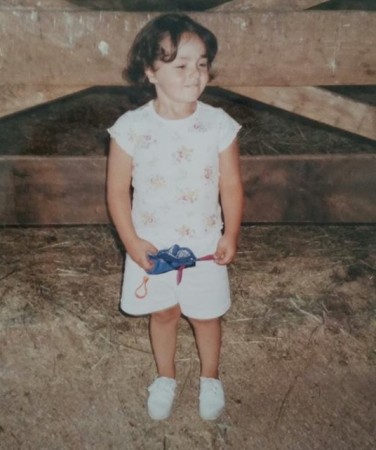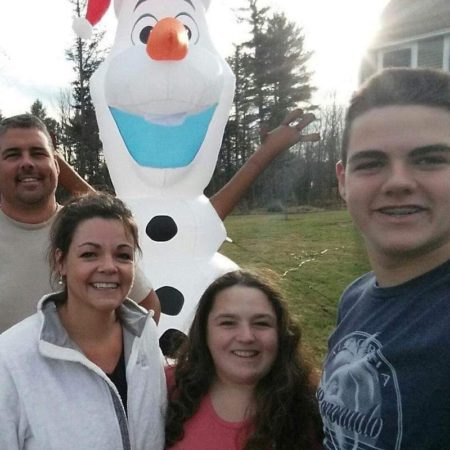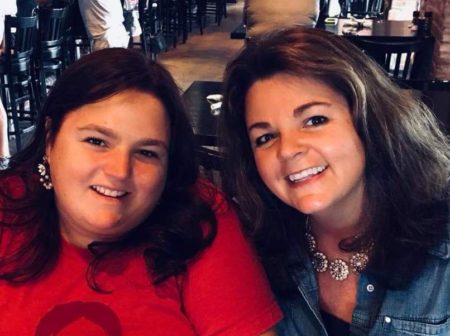
As a little girl, Brooke Caron had one ear infection after another. Ear tubes were a mainstay of her childhood.
All those infections led to a condition called cholesteatoma, which is a type of cyst in the middle ear. They also affected her hearing. Surgery corrected the problem for the most part, but not until she was 14 years old.
If her ears were the only problem Brooke had growing up, her family may never have discovered what was really wrong. She was also much shorter than other girls her age. Even today, at age 19, she’s only four feet, 11 inches tall.
When she was 10, she suddenly stopped growing. The pediatrician thought it might be “short stature syndrome” and recommended retesting her in six months. “We went home and I immediately googled short stature,” says Brooke’s mother Kathy. “Turner syndrome popped up.”
She’d never heard of it before, but when she looked at all the signs, Kathy knew that’s what her daughter had.
Signs and symptoms of Turner syndrome
The signs and symptoms of Turner syndrome (TS) can vary quite a bit. They include:
- Frequent middle ear infections
- Short neck (sometimes looks webbed)
- Low hairline back of the neck
- Low-set ears
- Small lower jaw
- Narrow palate (roof of the mouth)
- Short fingers and toes
- Fingernails and toenails that are soft and curl upwards
- Puffiness in the hands or feet
- Moles that are present since birth
Broad chest that looks somewhat like a shield- Arms or wrists that rotate in an unusual way (such as turning outward)
- Delayed growth
Brooke had almost every single sign. But what really caught her parents’ attention was the potential for some serious health issues. “We saw that there could be some heart issues,” says Kathy. “That’s when we demanded that she undergo testing because it could cause a heart attack.”
What is Turner syndrome?
Kathy was right. Brooke had Turner syndrome — a random genetic disorder that affects about one in 2000 females (only females).
We’re all born with 23 pairs of chromosomes. One pair determines our gender. We get one sex chromosome from our father and one from our mother. The mother always contributes an X chromosome and the father can contribute either an X or a Y chromosome. A girl generally has two X chromosomes and a boy will have an X and a Y.
A girl with Turner syndrome will be missing all or part of one of her X chromosomes.
Getting a diagnosis
The diagnostic testing Brooke underwent when she was 10 included a blood test called a karyotype — a chromosomal analysis that is 99.9 percent accurate. About two-thirds of girls with Turner syndrome are diagnosed during childhood or in their late teens. It can also be discovered through prenatal testing.
For instance, a prenatal ultrasound may show:
- Collection of fluid on the back of the neck
- Other abnormal fluid collections
- Heart abnormalities
- Kidney abnormalities
“When I was pregnant with Brooke,” says Kathy, “we had to have nine sonograms done because things weren’t developing correctly. There was one particular time we went in and they told us the brain wasn’t coming together correctly. We were in a panic at that time. Now that I’ve done a lot of research, I believe we could have found out that she had Turner’s.”
They might have found out if they had agreed to further prenatal testing, such as amniocentesis or chorionic villi sampling. They chose not to because they decided they would be fine no matter what.
Knowing would not have changed the diagnosis. But armed with that knowledge 10 years earlier could have made a difference. Today, they have a different perspective on prenatal testing. “If we’d known the diagnosis, we would have known how to help her out better,” says Kathy. “It would have changed things big time. We would have known right off that she would probably need growth hormones. When Brooke was diagnosed at 10 it was kind of late in the game to put her on growth hormones. That is why we are urging people to have the test done.”
Brooke’s dad Dwayne also urges persistence when you suspect something isn’t right. “The largest piece of the puzzle would be stature,” he says. “That’s the key, the tell all. Then you try to find the other pieces to the puzzle. Don’t give up if you think there might be something there. Many times you can be talked out of it and you need to keep being persistent. You know best because it’s your child or your own body. Early detection is important.”
Dealing with complications
There is no cure for Turner syndrome but some of the problems associated with it can be treated. Here’s a list of some of the possible complications.
- Heart issues
- High blood pressure
- Diabetes
- Hearing loss
- Kidney problems
- Hypothyroidism (which can cause weight gain)
- Celiac disease
- Dental and visual problems
- Curvature of the spine
- Osteoporosis
- Infertility
- Pregnancy problems
Fortunately, Brooke has not had any heart problems. However, she does have to contend with other complications. She has hypothyroidism and celiac disease. Her body also can’t produce female hormones. She’s currently on hormone replacements, which she’ll take until she’s around 24. Whether or not she can have children is unknown at this time. Even if she could, the risk of her having heart problems during delivery would have to be considered.
Given all she has to contend with, I think she has a wonderful attitude. “I’m actually very lucky,” she told me, “because there are girls who are affected a lot more than I am. I don’t have any of the heart issues so far and I don’t have kidney problems. So I consider myself very lucky in that respect.”
What she wishes she had growing up was more support outside of her family. “I played lacrosse in high school,” she says, “and it was tough. My coach was a good coach and a nice person but I was kind of the odd man out because of my short stature and weight. It was tough to keep up. There was nobody in my school that I knew who had TS. I didn’t have anybody to talk to.”
Brooke and her parents are trying to change that for other girls who have Turner syndrome. Kathy is the State of Maine Advocate/Representative for the Turner Syndrome Foundation. With the help of former State Senator Amy Volk, a resolution was passed marking February as Turner Syndrome Awareness Month in Maine.
“I don’t know if many people have ever actually heard of Turner syndrome,” says Kathy. “This will be an awakening. The goal is to create awareness, educate, and offer support. Mostly to help girls get diagnosed and get the proper help and support.”
Kathy and Brooke are eager to do some public speaking and offer as much support as they can to girls with Turner syndrome and their families. “I’m comfortable being there to say this is real,” Brooke says. “This is what it is and these are the things you need to look for. I want to aid in awareness and be there for other girls.”

An update (February 2019)
Two years have passed since we first met Brooke and her family. She had just been diagnosed with celiac disease, which was a struggle at the start. She says things are going much better now.
She’ll be graduating from the University of Southern Maine this year with a degree in English. She’s not sure what she’ll do after graduation but says she’d like to work at Idexx Laboratories. I asked her, “Why there?”
I went there during high school for a job shadow and I really, really enjoyed it. I’m looking to do whatever they have for English majors there, probably training, marketing communications, whatever they might have. I hope I can get in.
She and her mother continue to maintain TSF Maine on Facebook, where they try to spread the word about Turner Syndrome and share stories — their own and other people’s.
She’s met other girls with Turner’s, which has been a blessing.
I actually met a girl from Chicago through the Turner Syndrome Foundation’s Star Sister Mentorship P
rogram . I’ve been talking with her off and on throughout the fall and this past summer and that’s been really good.
You can learn plenty more about Turner syndrome on the Turner Syndrome Foundation website, as well as the Maine chapter FB page
If you’d like to talk to Kathy or schedule a speaking engagement, please send her an email. You can also reach out to Brooke by email.
Brooke says you can connect with her on social media, if that’s easier:
Instagram: scorpio_0004
Twitter: @Bc04Caron
And before you go, she invites you to watch this video she did a while back with the help of her brother Cameron.



My daughter was diagnosed in 2009. She was 17–the doctor’s never caught it until she went for her license. She has the Mosaic type. Very rare disease something like 2 in 2600 females are diagnosed.
Thanks for your comment Keith. I was told about one in 2000, but I’ve seen varying figures. I think there are probably many who go undiagnosed until, like your daughter, they are older. I hope she is doing ok.
My daughter was diagnosed at birth in September of 2011. We had never heard of Turner Syndrome until she was diagnosed with it. She has been receiving her treatments since she was a baby though and seems to be developing just fine now.
I’d never heard of it before either until I met Brooke and her family. I’m so glad to hear that your daughter is doing well.
Thank you for sharing our story & helping to bring awareness to Maine & thru out New England! Its encouraging to see folks who can relate & are excited to see awareness continues to spread! As you shared,this is a female only issue, so besides the medical piece, education, social, non-verbal learning as well as visual spartial are other areas we are aiming to educate people on. Should anyone be interested in contacting me for more info or to have me & my daughter speak at your school, work or providers office, please don’t hesitate to contact me at kcaron@tsfusa.org or our facebook page at TSF Maine.
Happy Turner Syndrome Awarness Month!
Kathy Caron/State of Maine Advocate for the Turner Syndrome Foundation
I’d never heard of Turner syndrome before, so thanks need to go to you and your family, especially Brooke, for all the hard work you’re all doing to create that awareness.
I wasn’t diagnosed until I was 19. If I had not gone to the doctor because of not starting my period, I don’t know that they would have found it. I am now 51. Hardest thing for me is not having children. I always wanted to be married and have a family but never found anyone who loved me and wanted to adopt. My toughest struggle right now is with diabetes. Luckily, I don’t have any hheart issues. It is hard to find friends and hate being treated differently and always being left out. Luckily I have my supportive parents and sister.
Hi, Carolyn. Thank you for taking the time to write. It sounds like you’ve had a rough time. I noticed when I was doing research for the blog post that there is at least one Turner Syndrome group on Facebook that is members only. Maybe you already belong, but if not, it might be a good place to connect with other women. Here’s the link:https://www.facebook.com/groups/2441303467/. Take care, Diane
Great insight on an important topic that most family and professionals don’t catch until late in the diagnosis. Brooke is a courageous young lady and a positive influence for others to look up too. Thank you Diane for all that you do for others, your community and your blogs. Without you, we may never know what to look for or where to turn for help in these uncertain situations.
What a wonderful thing that she is willing to share her story to help other girls and women. And thank you for your kind comments.
My little sister had Turner Syndrome.. miss her everyday…Her name is Lisa Dianne.. my angel